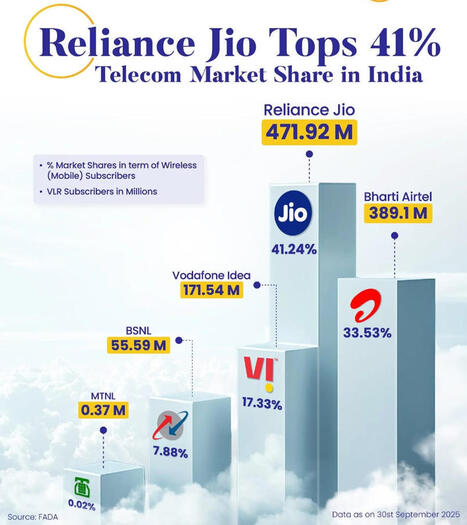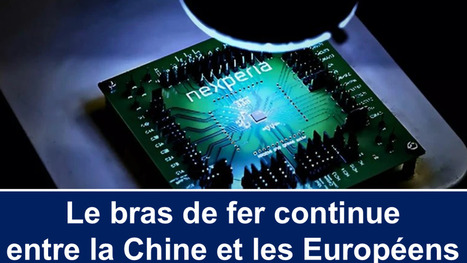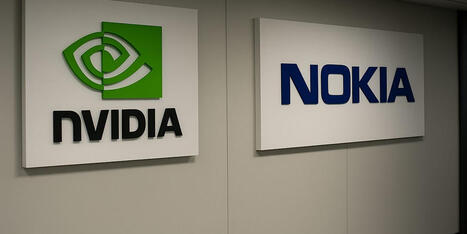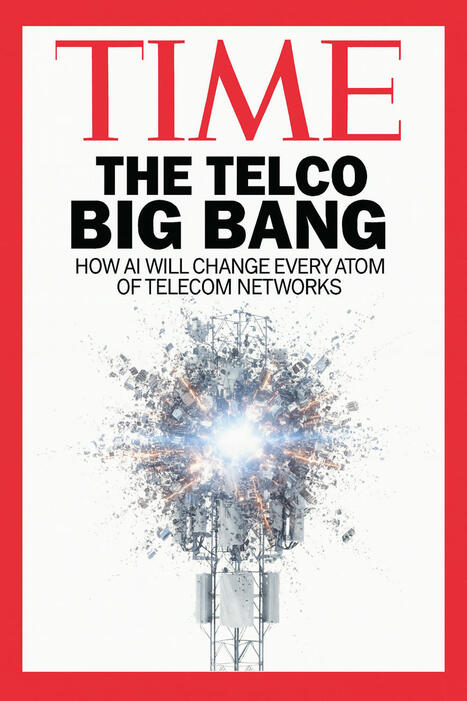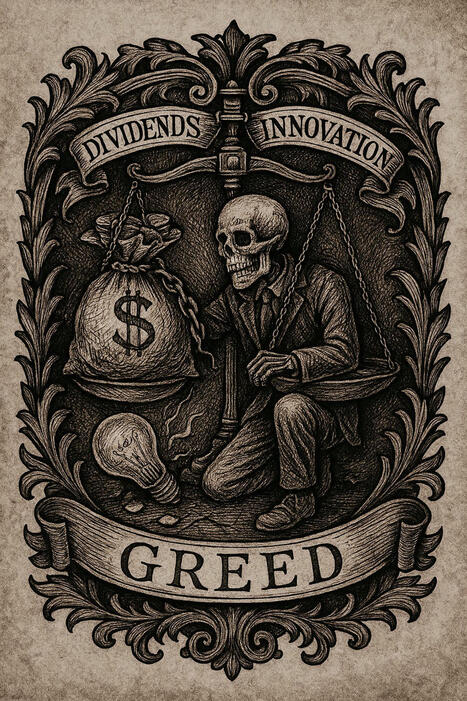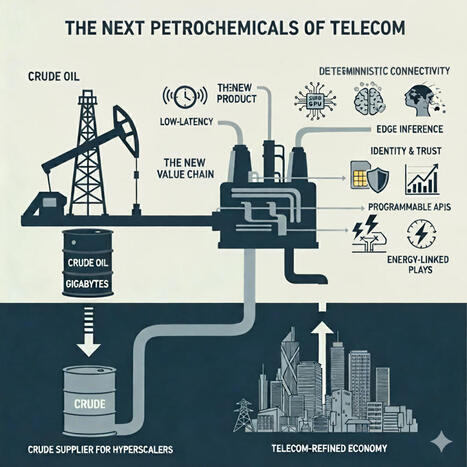 Your new post is loading...

|
Scooped by
Beeyond
November 20, 8:11 AM
|
India’s telecom market behaves like a digital continent. It carries volumes that rival entire regions, yet it runs on the lowest revenue per user among major economies. Two operators deliver world-class network performance at a national scale, one operator remains structurally distressed, and a state player anchors policy goals. This mix of extreme usage, thin margins, and relentless investment pressure creates a system that is both remarkable and unstable.

|
Scooped by
Beeyond
November 16, 2:05 PM
|
The reason these collisions keep appearing is that WiFi and cellular no longer occupy separate roles. They chase the same physics, the same mid-band capacity, the same enterprise environments, and the same edge compute opportunities. The Brussels decision is only the most recent signal that the two stacks are converging on the same territory, and every time that happens, the tension becomes visible.

|
Scooped by
Beeyond
November 10, 7:42 AM
|
I’ve spent the last year drinking from the AI firehose, part doctoral research, part field therapy. Between telco boardrooms and academic labs, I keep hearing the same wild claims about.
“AI transforming everything.”
To separate physics from PowerPoint, I asked two of my research partners to join me for an experiment: let’s run the industry’s favorite AI myths through a Bullcrap Meter.

|
Scooped by
Beeyond
November 5, 4:19 PM
|
Dans cette bataille, les trois géants européens se retrouvent tiraillés entre la volonté politique de l’UE et la réalité économique de leur premier marché. Visiblement, ils n’ont pas d’autre choix que d’accepter les quatre conditions imposées par Nexperia Chine.

|
Scooped by
Beeyond
November 5, 2:57 PM
|
Mercor aurait recruté près de 150 consultants afin de bâtir une intelligence artificielle capable de les assister au quotidien, selon Bloomberg. Le secteur s'interroge de plus en plus sur l'arrivée en force de cette nouvelle technologie.

|
Scooped by
Beeyond
October 28, 1:09 PM
|
When Nvidia takes a billion-dollar stake in an old-guard telecom vendor, it’s not a financial gesture but a signal. A signal that the AI arms race is moving from datacenters into the network fabric itself. On October 28, 2025, Nokia announced that Nvidia will invest $1 billion in newly issued shares, acquiring roughly 166 million shares, or about 3.5% of the company, and forming a deep strategic alliance to co-develop 6G and AI-native networking technologies. Nokia’s stock jumped 18 % within hours.

|
Scooped by
Beeyond
October 20, 11:12 AM
|
Before 2007, Telcos knew precisely who they were.
They built networks. They connected nations. They carried the weight of communication with pride. Telcos were infrastructure institutions: disciplined, engineered, predictable.
Then, in 2007, everything changed. The iPhone turned connectivity into an afterthought. The network disappeared behind the screen, and the center of gravity shifted from infrastructure to experience. For the first time, the telco wasn’t the main act; it was the invisible stagehand behind the digital revolution.

|
Scooped by
Beeyond
October 10, 9:13 AM
|
Les annonces de Pékin sont lourdes de conséquence pour les chaînes d’approvisionnement déjà fragilisées : désormais, n’importe quel produit, composant, ou technologie incorporant des terres rares ou savoir-faire chinois, devra obtenir une licence de Pékin pour être exporté, y compris si le produit se trouve déjà hors de Chine et si l’expédition se fait entre deux pays tiers.

|
Scooped by
Beeyond
October 6, 8:19 AM
|
In 2008, Europe’s telcos were the most valuable companies in technology. Today, their worth has fallen by more than 80%. We spoke to insiders to understand how the empire collapsed.

|
Scooped by
Beeyond
September 22, 6:25 AM
|
C’est une première mondiale qui fait déjà couler beaucoup d’encre. En Albanie, le Premier ministre Edi Rama vient d’intégrer à son gouvernement un ministre… totalement virtuel. Baptisée Diella, cette intelligence artificielle devient officiellement ministre en charge des marchés publics. Une décision symbolique et politique qui entend marquer un tournant radical dans la lutte contre la corruption.
Son rôle ? Superviser l’ensemble des appels d’offres publics du pays, secteur historiquement sensible en matière de corruption. Selon le Premier ministre, l’objectif est clair : rendre chaque denier public parfaitement traçable et transparent. Grâce à l’IA, plus d’arrangements opaques ni de conflits d’intérêts. Juste des algorithmes et des critères objectifs.

|
Scooped by
Beeyond
September 19, 1:58 AM
|
Telecom networks run on models. Erlang distributions, busy-hour factors, peak-to-average ratios, and oversubscription levels are the tools that let operators design networks without provisioning for absolute maximum demand. The assumption is that human behavior follows statistically smooth curves, allowing for the forecast of aggregate demand and the absorption of rare spikes with a margin of overcapacity.
AI breaks this foundation. Agent-driven traffic is non-ergodic: past averages do not predict future bursts. Each inference request is unique, decorrelated from the next, and capable of spawning chains of sub-requests across geographies.

|
Scooped by
Beeyond
September 8, 9:55 AM
|
We spend less than 1% of our revenue on R&D. In 2022, AT&T, with more than $120 billion in revenue, spent just over $1.2 billion on research and development. Vodafone and Telefónica are in the same range. Compare that with Alphabet, which allocates approximately 15% of its $280 billion in revenue to R&D, or Meta, at nearly 20%. Even Apple, often described as conservative, spends more than 7%.
Our spending goes elsewhere. CAPEX intensity for the sector runs at 15% to 18%. For Vodafone, €7.8 billion on €45 billion of revenue; for AT&T, roughly $24 billion a year. Spectrum auctions, towers, and fibre consume everything. Then come dividends. European operators yield between 5% and 8%. AT&T yields around 6. Debt service takes another 10% of revenue. The sector carries more than $1.7 trillion in debt, with leverage at three times EBITDA in many cases. After those obligations, there is nothing left for invention.

|
Scooped by
Beeyond
September 4, 9:05 AM
|
Près de 15.000 téléphones et ordinateurs ont été inspectés par les douanes américaines entre avril et juin 2025, un record depuis 2018. Les voyageurs étrangers, notamment canadiens, sont les premiers concernés.
|

|
Scooped by
Beeyond
November 18, 11:26 AM
|
Every week, I collect private confessions from telco CXOs. This time, I pulled together fifteen short stories. Small moments that expose the truths our industry keeps quiet. Real voices. Real pressure. Real mistakes. Real opportunities. A clearer picture of telco emerges one confession at a time. A collection of honest reflections from the people who actually run networks and see the industry from the inside every day.

|
Scooped by
Beeyond
November 14, 7:42 AM
|
The layoff wave that started in the technology sector in 2021 reset the rules of corporate finance.
More than 500,000 technology workers were cut between 2021 and 2025. In 2023 alone, companies announced 264,220 job reductions. This happened inside firms with operating margins above 25% and cash balances in the tens of billions.
Investors rewarded the cuts because they protected earnings and released capital for artificial intelligence programs that require extreme spending on compute, data centers, and model development. Meta declared a Year of Efficiency in 2023, removed 11,000 roles, and the stock jumped more than 19% in a single session. That reaction created a new norm. A layoff became a signal of discipline rather than distress.

|
Scooped by
Beeyond
November 6, 9:47 AM
|
Several companies are building brain implants to allow people to communicate with computers directly through their minds, benefitting those who are paralyzed, blind or otherwise have limited use of their limbs or sensory organs. In the long term, some entrepreneurs and investors think that brain implants will become everyday consumer technology, like cellphones. No such devices are approved by government regulators for long-term medical or recreational use.

|
Scooped by
Beeyond
November 5, 3:20 PM
|
Les startups misent sur une croissance rapide plutôt que sur une rentabilité immédiate. Mais entre ambitions démesurées et réalité du terrain, l’art du business plan consiste à bâtir des hypothèses solides sans céder aux mirages des tableurs. Un plan crédible doit articuler une vision, des données dûment étayées et une capacité d’adaptation face aux aléas. La crédibilité d’une équipe tient moins à la précision de ses prévisions qu’à sa lucidité et à sa faculté à s’adapter pour garder le cap lorsque les promesses se confrontent au réel.

|
Scooped by
Beeyond
October 29, 7:37 AM
|
Telco used to be the most exciting place on Earth. We were the people who made the impossible happen. We connected continents, carried the first digital signals, and built mobile networks that turned communication into a human right. We were the engineers who bent physics to our will. Then something happened. We turned into administrators of connectivity. The industry that invented the digital age now spends more time in regulatory filings than in labs.

|
Scooped by
Beeyond
October 23, 12:05 PM
|
Most telcos still haven’t come to terms with what AI truly means for their future. This is a 2007 iPhone moment on steroids, not another radio upgrade, not a “TechCo” rebrand, and certainly not a digital transformation checklist. AI is changing the very physics of how humans, and now machines, connect and interact across the digital and physical world.

|
Scooped by
Beeyond
October 13, 8:56 AM
|
This week, the confession comes from the other side of the table. From the people who have built our systems, sat through our meetings, and quietly watched the same story repeat across continents: the vendors.
They have seen how decisions are made, how timelines are invented, and how politics replaces logic. They know when a project will fail before the first contract is signed. They understand that most telcos no longer innovate; they negotiate. Procurement has replaced product. Compliance has replaced creativity.

|
Scooped by
Beeyond
October 8, 11:30 AM
|
Telco CEOs have changed as much as the networks they run. Two decades ago, most were engineers obsessed with coverage maps; today, they’re diplomats managing politics, investors, and cloud partners.

|
Scooped by
Beeyond
October 1, 7:40 AM
|
In classical AI, an agent is nothing mystical. It is a system that perceives, makes decisions, and acts within an environment. A thermostat is an agent. A Roomba is an agent. The term never implied consciousness or autonomy. It was a clean abstraction for building systems that respond to inputs and produce outputs in pursuit of a goal.
In the era of generative AI, the word “agent” has been hijacked. Vendors present agents as if they were digital employees who can sit in your enterprise, learn the ropes, and work unsupervised.

|
Scooped by
Beeyond
September 19, 4:47 AM
|
Mark Zuckerberg parie sur des lunettes intelligentes dopées à l’IA pour succéder à l’iPhone. Objectif : créer un assistant personnel capable de voir, entendre et comprendre notre quotidien.

|
Scooped by
Beeyond
September 10, 11:37 AM
|
From selling data buckets to monetizing interactions, trust, and intelligence, why gigabytes are the crude oil of telecom, and value lies in the petrochemicals built on top.

|
Scooped by
Beeyond
September 4, 9:13 AM
|
The environmental impact of streaming extends far beyond servers and networks: it reaches our mobile devices and living rooms. At Greening of Streaming, we’ve been investigating where and how energy is consumed across the streaming ecosystem. These four recommendations emerged from our research and testing. We don’t claim they are the most important actions, but they are practical, user-facing steps that operators and service providers could promote or support today.
|






 Your new post is loading...
Your new post is loading...
